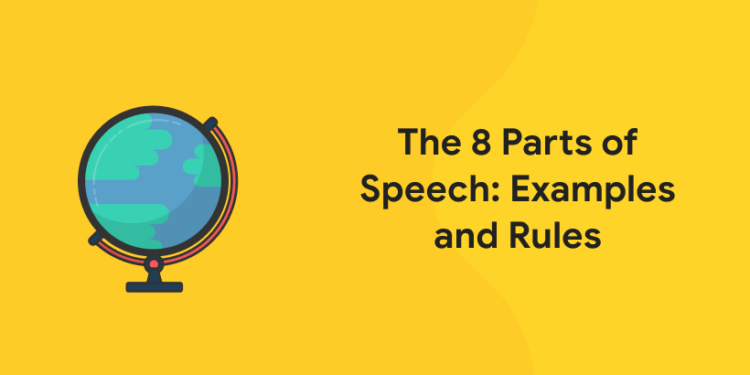Table of Contents
Every word belongs to any of the parts of the speech. There are eight parts of speech in the English language. Do you know which are the eight parts of speech that can help us in identifying the role of a particular word in a particular sentence? Keep reading to know more about the eight parts of speech. the parts of speech play a very crucial role in the study of the English language. The teachers will start with the parts of speech once the kids learn the words thoroughly. Knowing the purpose of each word is inevitable in the construction of sentences with meanings associated with it. The word with a particular part of speech is detonating the specific function of the word that ought to be performed in a sentence. Without learning the parts of speech learning English grammar is impossible for the learners out there. The parts of speech refer to the role of a word in a sentence. These roles are assigned for each word to showcase the performance in a better way. The parts of speech in English grammar can help the words in a sentence to work together without any hesitation.
Parts of Speech
A part of speech is a classification of words that have equivalent grammatical operations or effects. They recreate identical positions in a sentence. There are eight parts of speech in the English language without which the construction of the sentence with meaning seems to be impossible. the eight parts of speech in English are noun, pronoun, verb, adjective, adverb, preposition, conjunction, and interjection. The function of each word is visible through the specific parts of speech. For example, a verb designates the action of a subject or the subject’s condition of being. The part of speech demonstrates how the word operations in significance, meaning, as well as grammatically within the sentence. A particular phrase can serve as more than one component of speech when utilized on diverse occasions. Knowledge about the parts of speech is important for defining the proper connotation of a word when operating the glossary.
Ace to the tips to learn English fluently here!
The 8 Parts of Speech: Examples and Rules
1: Who was the first woman President of India?
NOUN
A noun is commonly described as the name of a person, place, thing, or idea. Or in other words, a noun can be defined as the word intending person, place, thing, or idea in a sentence. Nouns are always accompanied by an article the, a, an), but it is not a mandatory rule. A few examples of nouns include a book, bag, Christoper, London, County, etc. Nouns can be categorized into two namely, Common nouns and proper nouns.
Proper nouns invariably begin with a capital letter whereas the common nouns do not start with a capital letter. Nouns can also be singular or plural, concrete or abstract. Nouns can have several varieties. Nouns that show possession can be identified with the presence of ‘s with the word. Nouns can operate in distinguishable functions within a sentence to form meanings. According to the purpose of the sentence, a noun can act as a subject, direct object, indirect object, subject complement, or object of a preposition. A noun is a term that anoints, a concept, object, person, or place. In a nutshell, any word capable of denoting something is a noun. The common nouns are general names of things like games, water, solid, cat, fish, ball, etc. whereas Proper nouns are distinctive names are given for individual things, for example, MacDonalds, Goa, Paris, Jennifer, June, etc.
PRONOUN
A pronoun is a word that is used instead of a noun. Or in other words, a pronoun can be regarded as a word that can replace a noun. It is impossible for a language used to specifically mention a noun in all the sentences. Instead of doing so, the user can replace the noun with a pronoun according to the role and function of the word in that particular sentence. A few examples of pronoun includes He, she, it, I, they, we, you, etc. A pronoun is superseded for a precise noun, which is known by the phrase antecedent. For example, the antecedent of the pronoun he is boy, she is girl, it is a thing, etc.
There are several kinds of a pronoun like the personal pronoun, possessive pronoun, relative pronoun, demonstrative pronoun, reciprocal pronoun, and emphatic and interrogative pronoun. The personal pronouns direct to distinctive individuals or items whereas the possessive pronouns demonstrate ownership. The reflexive pronouns are yet another category that is used to denote or highlight another noun or pronoun. But the case of relative pronouns is different. The relative pronouns familiarize a subordinate clause whereas demonstrative pronouns determinate and refer directly to nouns. Examples of different kinds of pronouns are given below for the learners to refer to.
- Personal pronouns: I; you; they; she
- Relative pronouns: who; which; that; who
- Possessive pronouns: mine; yours; his; theirs
- Demonstrative pronouns: that, this; these; those
- Emphatic / Reflexive pronouns: myself; herself; itself; ourselves
- Interrogative pronouns: what; which; whom; whose
- Reciprocal pronouns: one another; each other
Grab the latest GK study materials! Register here!
VERB
In the English language, the verb is the action word or the word that denotes the action. Adverb expresses the action in a particular sentence and can add up additional meanings to the sentence. A few examples of the verb are jumped, kick, call, try, dance, sing, fall, pleading, etc.
There can be the main verb and helping verbs or auxiliary verbs in a sentence. The auxiliary verb is also known as a helping verb that can help the learners to support the verb and give clarity to the sentence. For example: in the sentence, He can dance well; dance is the main verb and can is the auxiliary verb.
A verb must conform with its subject in numeral (both are singular or both are plural). Verbs also accept additional states to communicate tensely. without the action, the word sentence seems to be plain. The action word suggests the whole action that the word in a sentence performs.
Ace to the basic grammar topics for spoken English here!
ADJECTIVE
An adjective is one of the parts of speech which can modify the noun. It is also used to describe or elaborate on the noun or the pronoun. A few examples of adjectives include old, blue, cozy, tall, smart, beautiful, lazy, poor, etc. The adjective is important in a sentence to describe the noun in the sentence.
The adjective can usually respond to the query of which one, what kind, or how numerous. They are used to describe nouns in any word. Nouns are words that describe people, ideas, places, etc. The adjectives are used to qualify the describing words. An adjective can appear before the noun it illustrates. The adjectives are at a lot of retribution. Adjectives can improve the quality of the sentence and make it even more figurative.
Adjectives are of different types. They can be Comparative Adjectives and Superlative Adjectives. A few examples of Comparative Adjectives are as follows
- She’s taller than her friends
- The soil is fertile
- He is faster than her
- I am taller than my brother
A few examples of superlative adjectives include
- She is the tallest
- Their kitchen is the biggest
- That knife is the sharpest
ADVERB
An adverb modifies the verb. In the English language, the adverb is used to describe a verb. It can not only describe verbs but also adjectives or adverbs. The adverb plays a role in the sentence. The action can be effectively described using adverbs. A few examples of adverbs include carefully, fast, gently, swiftly, etc. An adverb represents or alters a verb, an adjective, or another adverb. It can never act upon a noun. It responds to the queries of when, where, how, why, beneath what circumstances, or to what extent. Adverbs frequently complete in -ly.
PREPOSITION
In the English language, prepositions play a very vital role. A preposition is a word positioned before a noun or pronoun to construct a phrase revising another phrase in the sentence. Common examples for prepositions include by, on, with, in, at, with, about, until, and for.
- He is with me
- I talk about the project
- Hold a meeting before noon
- The bag is on the desk
- He is the elected member of the party
- The toy under the sofa looks cute
- A cat is located behind the bush
A preposition is invariably the domain of a prepositional phrase. The prepositional phrase nearly consistently serves as an adjective or as an adverb. The main examples of prepositions include by, except, for, from, in, into, like, near, of, off, on, above, up, upon, at, before, behind, since, too, besides, between, down, during, below, toward, through, under, until, with, within, about, against, along, around. The adverbs show the relationship between words.
CONJUNCTION
A conjunction is a part of the speech that can join the phrases, words, or clauses. Conjunctions can be of different types, they can give more meaning to the word. The conjunctions are also called the connecting words. For instance, and, but, or, nor, for, so, yet, because, while, etc.
Conjunction merges words, phrases, or clauses, and demonstrates the connection between the segments bound. The different kinds of conjunctions include Coordinating conjunctions and Subordinating conjunctions. Coordinating conjunctions conjoin grammatically matching components. Subordinating conjunctions conjoin clauses that are not equivalent. Few subordinating conjunctions such as because, although, while, since, etc.
- Coordinating conjunctions: and;but; so; yet; for; or; nor
- Correlative conjunctions: not only/but also /neither/nor; either/or
- Subordinating conjunctions: e.g. although; were; until, because; while; which
Coordinating Conjunctions are used to connect two classes of words, Or simple sentences (independent clauses). Correlative Conjunctions are employed to cohere alternative or equivalent components. Subordinating Conjunctions are employed to truss subordinate clauses to main clauses.
INTERJECTION
An interjection is a part of speech that is used to express emotions and feelings. For instance, Wow!… Oops!, Oh!… etc. Interjections are exclamatory sentences. An interjection is a phrase employed to represent sentiment. It is frequently observed by an exclamation point.
Interjections are expressions used to articulate a sentiment or a sensation such as astonishment, satisfaction, contempt, anxiety, excitement, ache, zeal, etc. They emerge at the commencement of a sentence and are not connected to it grammatically. For instance, the following examples can help the learners to know more about interjection.
- Wow, that’s an extraordinary piece!
- Oh, I didn’t understand you!
- Ouch! It hurts!
- Ow, that sucks!
- Ah, I apprehend now!
- Oops, I forgot to refill the bottle!
Those candidates who wish to improve their English language skills and writing skills can use the Entri App to improve their language proficiency. The Entri App can help the candidates to provide the best source of knowledge and wisdom to the enthusiastic learners out there. The expert team at Entri App can help the candidates to give color to their wings of dreams.
Attempt a quiz! Download Entri App here!













